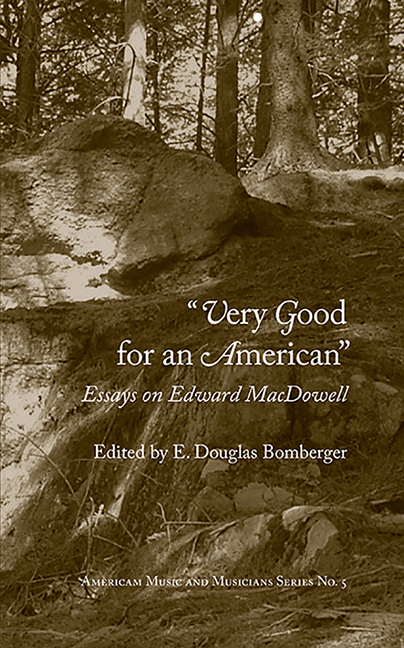Book contents
- Frontmatter
- Table of Contents
- Illustrations
- Contributors
- Acknowledgments
- Introduction: MacDowell at 150
- Edward MacDowell and the Society of Friends
- Historical Concerts in New York City, 1860-1876: An Approximation
- “No MacDowell, No Carreño”: Teresa Carreño's Contributions to the Dissemination of Edward MacDowell's Piano Music
- MacDowell, Liszt, and the Symphonic Tone Poem
- Wagnerian Influence and Motives in the Works of Edward MacDowell
- “On Sundays there was the music …” George Whitefield Chadwick between symphony and organ
- MacDowell vs. Butler: The “Idealist” Professor and the Administrator of “Materialism”
- Parallels in the Careers of Edward A. MacDowell and Chou Wen-chung
- American Bayreuth: The 1910 Peterborough Pageant and the Genesis of the MacDowell Colony
- Selective Bibliography
- Index
Parallels in the Careers of Edward A. MacDowell and Chou Wen-chung
- Frontmatter
- Table of Contents
- Illustrations
- Contributors
- Acknowledgments
- Introduction: MacDowell at 150
- Edward MacDowell and the Society of Friends
- Historical Concerts in New York City, 1860-1876: An Approximation
- “No MacDowell, No Carreño”: Teresa Carreño's Contributions to the Dissemination of Edward MacDowell's Piano Music
- MacDowell, Liszt, and the Symphonic Tone Poem
- Wagnerian Influence and Motives in the Works of Edward MacDowell
- “On Sundays there was the music …” George Whitefield Chadwick between symphony and organ
- MacDowell vs. Butler: The “Idealist” Professor and the Administrator of “Materialism”
- Parallels in the Careers of Edward A. MacDowell and Chou Wen-chung
- American Bayreuth: The 1910 Peterborough Pageant and the Genesis of the MacDowell Colony
- Selective Bibliography
- Index
Summary
“It's a poor sort of memory that only works backwards”
(Lewis Carroll, Alice in Wonderland)The careers of Edward MacDowell and Chou Wen-chung, though separated by more than half a century, frequently involved similar issues, among them: crossing national and cultural boundaries, professional involvement with the cities of Boston and later New York, and affiliations with Columbia University that—although they provided valuable opportunities for both composers—ultimately hindered their compositional activity. As we track questions relating to race, ethnicity, national identity, and intercultural dynamics, we can see a number of parallel challenges that both composers confronted, often with quite different results. As faculty of Columbia University, both men shouldered heavy responsibilities for designing and delivering the music curricula. Time commitments demanded by administration led to an appalling reduction of musical works during the years of their administrative activities. Interestingly, MacDowell's and Chou's ideas for planning students’ curricula and for designing departmental structures have important elements in common.
“A time to be born”
Consistent Inaccuracies in Data
The parallel issues in the lives of Edward MacDowell and Chou Wen-chung commence at the times of the respective composers’ births. Chou's birth date, like MacDowell's, has been inconsistently reported during his lifetime. In MacDowell's case, his tombstone originally bore the incorrect birth year of 1861 but has since been corrected to read 1860. Apparently MacDowell himself allowed this piece of misinformation to be accepted as fact.
In my biography of Chou Wen-chung, I note that, “according to reputable music dictionaries, Chou Wen-chung was born on May 16, June 29, and July 29, 1923. In his own curriculum vitae, Chou lists a fourth birth date, July 28, 1923.” The disparities here arise in part from the differences between the calendars used in Chinese and Western cultures. At the time of Chou's birth, the Chinese calendar consisted of twelve lunar months with intercalary months interpolated at regular intervals to balance the difference between the 354-day lunar year and the 365-day solar year. Chou was born in the fifth month of the year of the Boar; here is the source for a birthday in “May,” which, though it certainly is the fifth month of the Western calendar, is clearly not the fifth month of the Chinese calendar.
- Type
- Chapter
- Information
- Very Good for an AmericanEssays on Edward MacDowell, pp. 163 - 194Publisher: Boydell & BrewerPrint publication year: 2017

